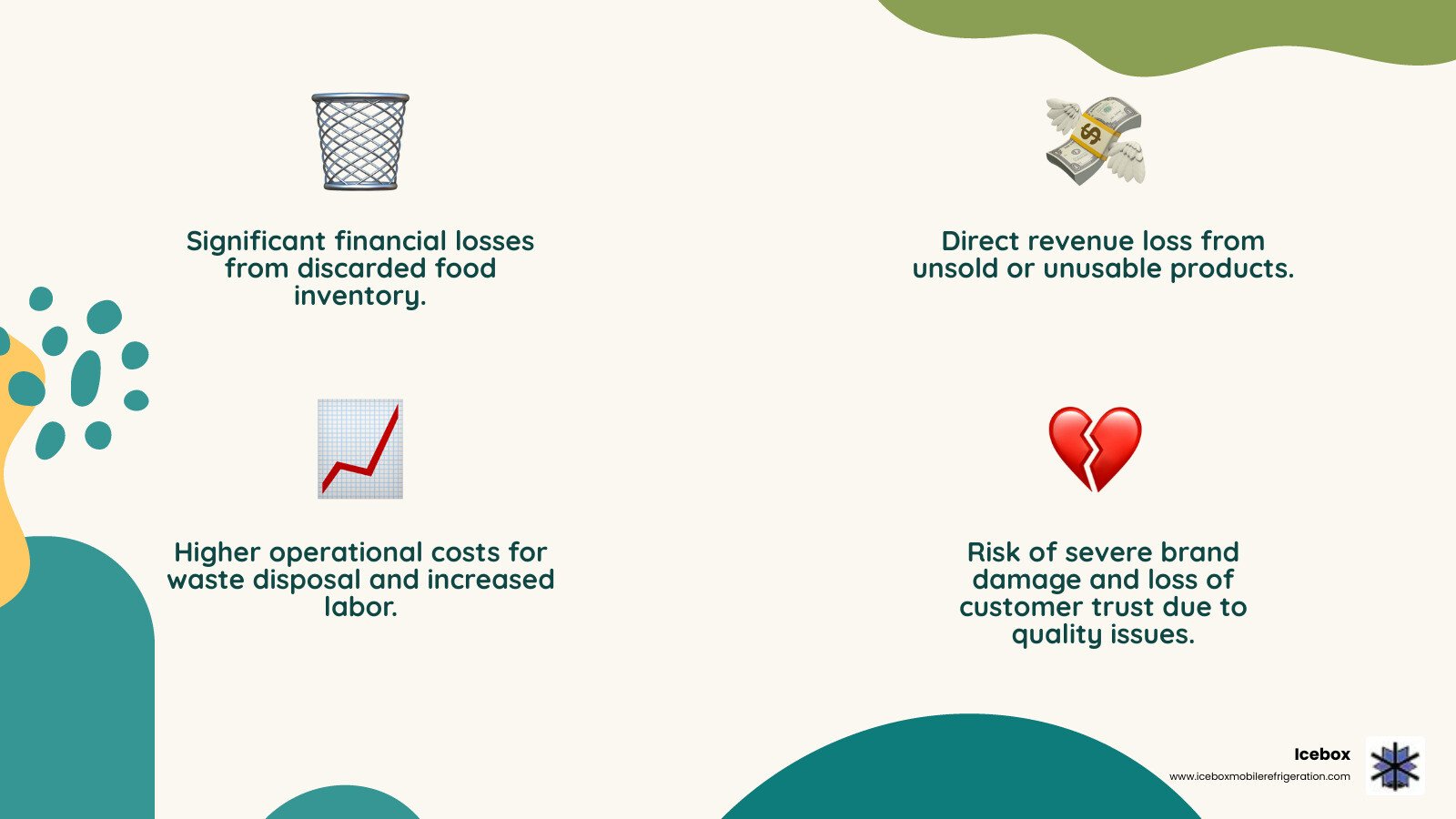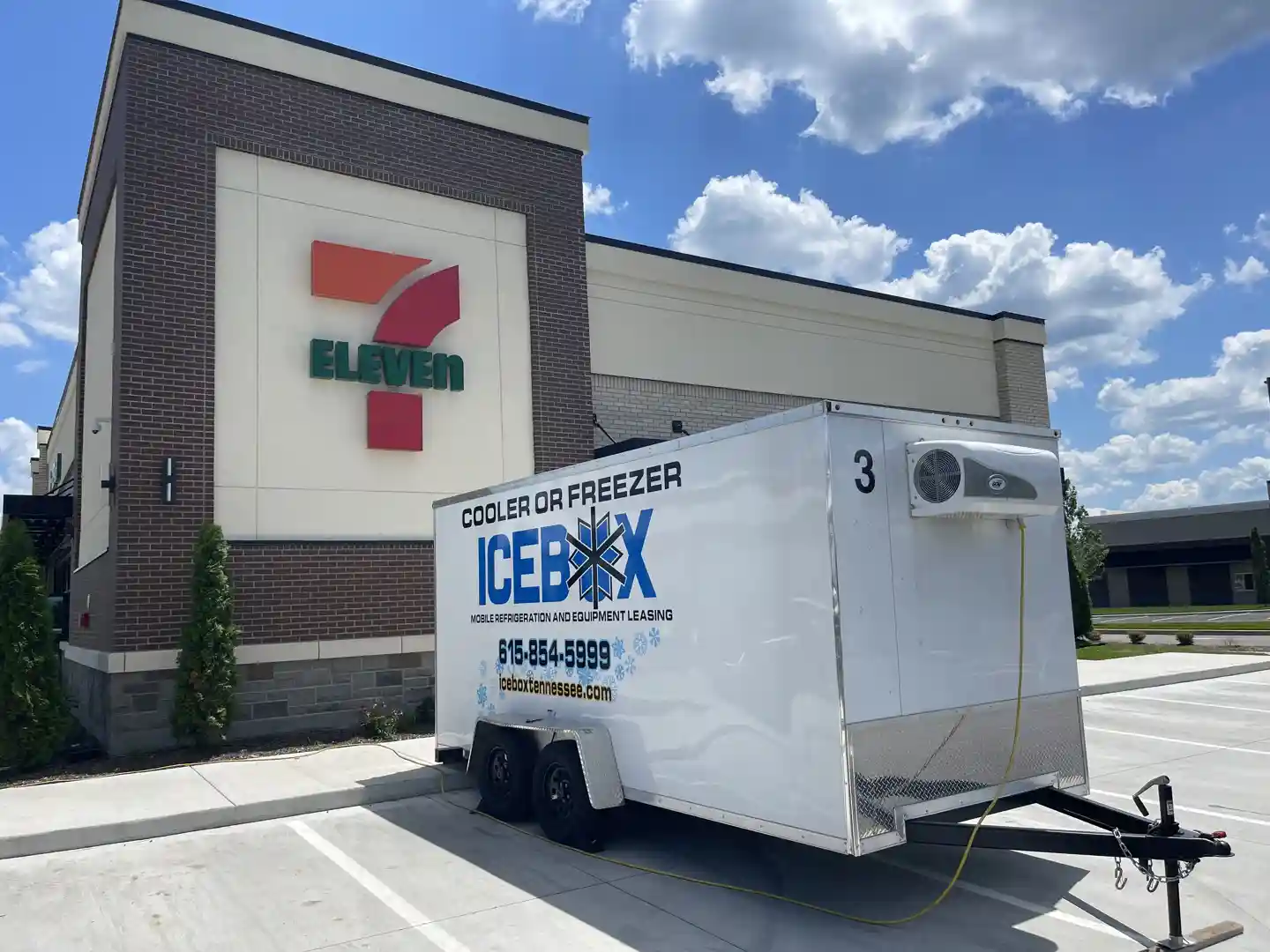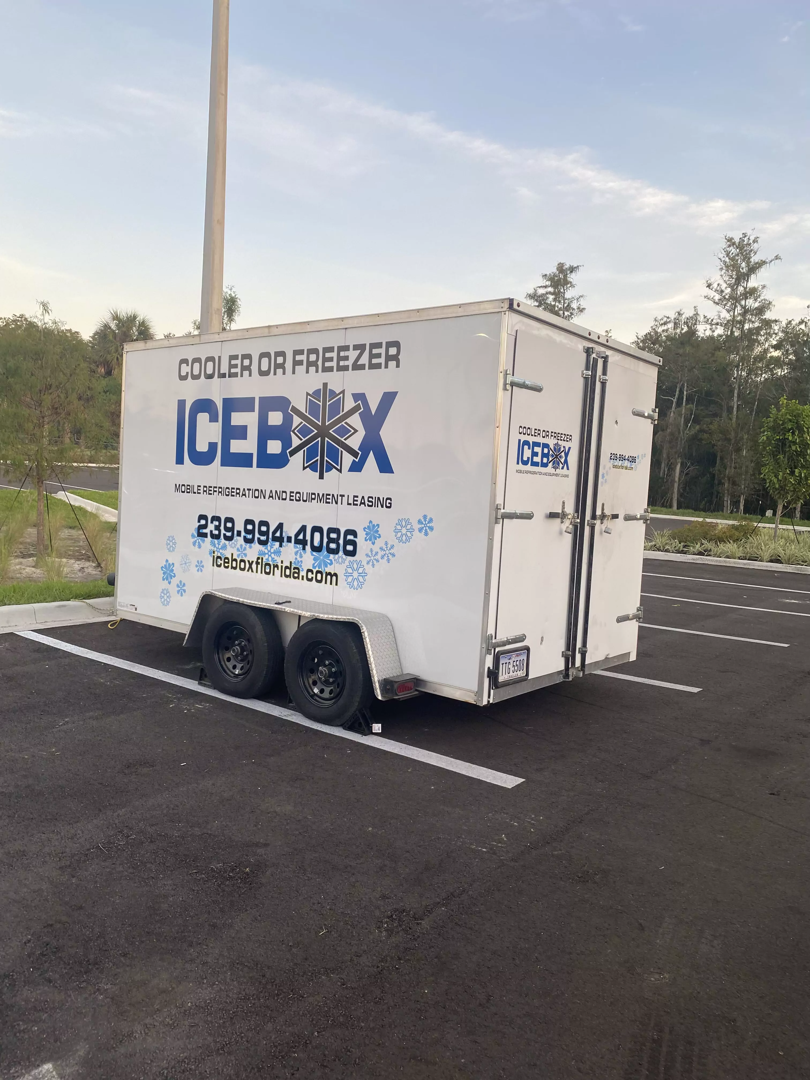Protecting Your Profits: Why Food Spoilage Prevention Matters
Mastering food spoilage prevention is a critical skill for anyone handling food, especially for businesses like caterers, restaurants, and event planners. In today's challenging economic climate, with overall food prices having increased a staggering 25 percent between 2019 and 2023, every wasted ingredient directly impacts your bottom line. Beyond cost, preventing spoilage is vital for public health, as an estimated 1 in 6 Americans will get sick from food poisoning each year, sending 128,000 to the hospital.
For quick, actionable strategies on how to prevent food spoilage:
- Maintain Optimal Temperatures: Keep cold foods at or below 40°F (4°C) and hot foods above 140°F (60°C). This is crucial because bacteria multiply rapidly between these temperatures.
- Refrigerate Promptly: Ensure perishable items are refrigerated within two hours of purchase or preparation, especially for large events or busy kitchens.
- Prevent Cross-Contamination: Always separate raw ingredients from cooked or ready-to-eat foods using dedicated utensils and surfaces.
- Prioritize Cleanliness: Wash hands, equipment, and preparation surfaces frequently and thoroughly to eliminate harmful microorganisms.
Effective food spoilage prevention doesn't just save money; it safeguards your reputation and the health of your customers. For businesses facing seasonal overflow, kitchen renovations, or large-scale events, reliable on-site mobile cold storage solutions are indispensable. Icebox Mobile Refrigeration provides refrigerated trailers and mobile cooler trailers that deliver critical temperature control directly to your location, ensuring your perishable inventory remains safe and fresh.

Mastering Temperature Control for Commercial Food Spoilage Prevention
Temperature control is essential for food spoilage prevention. It's your shield against the bacteria, molds, and yeasts that turn fresh ingredients into expensive garbage.
The science of food spoilage is about microbial growth. When microorganisms like bacteria, molds, and yeasts land on food, they consume its nutrients. As they multiply, they produce waste that makes food smell, taste, and look awful. But microorganisms aren't the only cause. Enzymatic reactions within the food itself also cause problems, like a cut apple turning brown. These natural chemical processes continue after harvest or slaughter, slowly degrading food quality.
For commercial operations, understanding these processes is key to protecting customers from pathogenic bacteria like Salmonella and E. coli, and staying compliant with strict food safety regulations.
Understanding the Causes and Risks of Spoilage
Microorganisms are everywhere and cause spoilage. Knowing the different types helps you fight back effectively.
Bacteria are a major concern. Spoilage bacteria like Pseudomonas affect taste and smell. More dangerous are pathogenic bacteria like Salmonella, E. coli, and Listeria, which can cause serious illness without any warning signs. Food can appear normal while harboring harmful bacteria.
Molds, the fuzzy growth on items like bread or cheese, thrive in humidity and can produce dangerous mycotoxins. Yeasts cause fermentation, spoiling fresh produce.
Beyond microbes, chemical reactions like oxidation turn fats rancid. Light can destroy vitamins and create off-flavors in dairy. Physical damage from bruising or cutting breaks down cell walls, making food more vulnerable to spoilage.
The health risks from spoiled food range from mild upset to life-threatening illness. Food poisoning affects 1 in 6 Americans annually, hospitalizing 128,000. Children, the elderly, pregnant women, and the immunocompromised face the highest risks. For detailed statistics on foodborne illness, check out the Scientific research on foodborne illness statistics.
The Critical Role of Temperature in Food Spoilage Prevention
Temperature is your best tool for food spoilage prevention. It controls how fast bacteria multiply and enzymes work. Proper temperature control wins most of the battle.
The Temperature Danger Zone between 40°F to 140°F is where harmful bacteria can double their population every 20 minutes. Keeping cold foods cold and hot foods hot isn't a suggestion—it's your business's lifeline.
For refrigeration, aim for temperatures at or below 40°F, though many food safety experts recommend 35°F to 38°F for a safety buffer. This range dramatically slows bacterial multiplication and keeps enzymatic reactions in check.
Freezer temperatures should stay at 0°F or below. Freezing doesn't kill most bacteria, but it stops them from multiplying and puts enzymatic reactions on pause. Food stays safe indefinitely at proper freezer temperatures, though quality may decline over time.
This is exactly why our mobile cooler trailers and mobile freezer trailers are engineered to maintain these critical temperatures consistently. Whether you're dealing with a kitchen renovation, seasonal overflow, or a large catering event, our units keep your inventory safely out of the danger zone. The USDA guidance on the 'Danger Zone' provides excellent technical details, and you can learn more about how our equipment helps with temperature control in our guide to Portable Cold Storage Units.
Best Practices for On-Site Cold Storage
Having a reliable refrigerated trailer is just the beginning. How you organize and manage the food inside makes all the difference for effective food spoilage prevention. Whether you're running a busy restaurant kitchen or managing a large outdoor event, these practices will save you money and keep your customers safe.
First-In, First-Out (FIFO) is your golden rule for inventory management. When new stock arrives, place it behind existing items of the same type. This simple system ensures older products get used first, preventing waste from expired goods. It sounds basic, but FIFO can dramatically reduce your spoilage losses.
Proper food labeling might seem tedious, but it's a lifesaver during busy periods. Date everything with purchase dates, preparation dates, or when packages were opened. Your team can quickly spot items that need immediate use, preventing dangerous guesswork about freshness.
Air circulation keeps temperatures consistent throughout your mobile cooler trailer. Don't pack items so tightly that air can't flow freely. Leave space between containers and never block the vents. Our walk-in units are designed for optimal airflow, but smart loading practices help them work even better.
Cross-contamination prevention protects your customers and your reputation. Always store raw meats, poultry, and seafood on the lowest shelves, well below ready-to-eat foods like prepared dishes, produce, or dairy products. This prevents dangerous drips from contaminating other items. Storing raw meat properly isn't just good practice – it's essential for food safety compliance.
Here's a quick reference for storage times that can help with your inventory planning:
| Food Item | Refrigerator (40°F) | Freezer (0°F) |
|---|---|---|
| Ground Meat | 1-2 days | 3-4 months |
| Whole Poultry | 1-2 days | 12 months |
| Cooked Meat/Poultry | 3-4 days | 2-6 months |
| Fresh Fish | 1-2 days | 6-8 months |
| Leftovers (Cooked) | 3-4 days | 2-3 months |
| Eggs (in shell) | 3-5 weeks | Not recommended |
| Dairy Milk | 5-7 days (after opening) | 3 months |
| Hard Cheese | 3-4 weeks (opened) | 6 months |
| Deli Meats (opened) | 3-5 days | 1-2 months |
| Berries | 1-2 days | 6-12 months |
| Leafy Greens | 3-7 days | Not recommended |
Advanced Food Spoilage Prevention for Businesses
Smart businesses don't just react to problems – they plan for them. Contingency planning for cold storage emergencies can mean the difference between a minor inconvenience and a major financial disaster.
Consider what happens during equipment failure. Your main walk-in cooler breaks down on a Friday afternoon, and you've got thousands of dollars in perishable inventory at risk. Our 24-hour emergency service and easy-to-set-up mobile cooler trailers can be on-site quickly, preventing catastrophic losses while your equipment gets repaired.
Seasonal overflow challenges many food businesses during holidays or peak seasons. Rather than cramming extra inventory into inadequate space and risking temperature fluctuations, a temporary mobile freezer trailer provides the additional capacity you need to handle increased stock safely.
Kitchen renovations can disrupt your cold storage for weeks or months. Our refrigerated trailers allow you to maintain normal operations throughout construction, keeping your business running smoothly while your permanent facilities are updated.
Special events and catering needs often require significant on-site cold storage in locations without existing refrigeration. Our mobile units deliver reliable temperature control directly to your event location, whether it's an outdoor wedding, festival, or corporate gathering.
For more information about how our emergency cold storage solutions can protect your business, visit our Emergency Cold Storage resource page.
Your Partner in Preservation: Ensuring Food Safety and Quality
When it comes to food spoilage prevention, we know you're not just protecting inventory—you're safeguarding your reputation. Every meal that leaves your kitchen carries your name, and even one incident of spoiled food can ripple through online reviews and word-of-mouth faster than you can say "food poisoning." Your customers trust you to deliver quality, and that trust starts with keeping food fresh and safe from the moment it arrives at your business.
The numbers tell a sobering story about waste in America. We're throwing away about 32% of all food we bring into our homes, which for the average household spending $5,700 on groceries yearly, means $1,825 straight into the trash. For commercial operations like yours, these numbers multiply dramatically. But here's the good news: effective food spoilage prevention through proper cold storage doesn't just protect your bottom line—it positions your business as environmentally responsible and operationally smart.
When you maintain consistent temperatures and follow proper storage protocols, you're contributing to sustainable practices that reduce waste and demonstrate your commitment to quality. Our mobile cooler trailers and refrigerated trailers help you keep more of what you buy, reducing your environmental footprint while increasing your efficiency. It's a win-win that your customers will notice and appreciate.
The Four Pillars of Food Safety: Clean, Separate, Cook, Chill
Think of food spoilage prevention as resting on four simple but powerful pillars. These aren't complicated rules—they're straightforward practices that, when followed consistently, create an ironclad defense against foodborne illness and spoilage.
Clean is your first line of defense. We're talking about washing hands with soap and water for at least 20 seconds, especially after handling raw ingredients. But it goes beyond hands—every surface that touches food needs thorough cleaning and sanitizing after each use. Those cutting boards, countertops, and utensils can harbor harmful germs that spread quickly throughout your kitchen if you're not vigilant.
Separate means keeping raw meats, poultry, seafood, and eggs away from ready-to-eat foods. Cross-contamination is sneaky—it happens when raw chicken juices drip onto lettuce, or when you use the same cutting board for raw meat and cooked vegetables without proper cleaning. In your mobile freezer trailer or refrigerated trailer, this means storing raw products on bottom shelves so gravity works with you, not against you.
Cook to the right internal temperature—this is where a good food thermometer becomes your best friend. Ground beef needs to hit 160°F (71°C), while poultry requires 165°F (74°C). When reheating leftovers, bring them to at least 165°F (74°C) throughout. These temperatures aren't suggestions; they're the proven standards that kill harmful bacteria.
Chill is where temperature control becomes king, and it's where our mobile cold storage solutions really shine. Perishable foods need refrigeration within two hours of cooking or purchasing—or just one hour if it's above 90°F (32°C) outside. Your refrigerator should stay at or below 40°F (4°C), while freezers need to maintain 0°F (-18°C) or below. Freezing doesn't destroy germs, but it keeps food safe until you're ready to cook it properly.
For comprehensive guidance on implementing these practices, the The four steps to food safety provides excellent detailed information that every food service professional should bookmark.
Smart Solutions for Your Cold Storage Needs
In the world of commercial food service, flexible and reliable cold storage isn't a luxury—it's essential for effective food spoilage prevention. This is where Icebox Mobile Refrigeration becomes your strategic partner, not just another vendor.
We provide mobile refrigeration and cold storage rental services along the East Coast, specifically designed for businesses that need reliable refrigeration delivered directly to their location. Our refrigerated trailers and mobile freezer trailers maintain consistent, precise temperatures that keep your perishable inventory safely out of the "Danger Zone." No more worrying about temperature fluctuations or equipment failures during critical periods.
On-demand capacity is what sets us apart from traditional solutions. Whether you're managing a sudden surge in orders, preparing for a large catering event, or simply need extra space during your busy season, our easy-to-set-up, 110-volt walk-in trailer units provide immediate relief. We deliver the unit directly to your site, and you simply plug it in and start using it—no complicated installation or lengthy setup procedures.
For event support, caterers and event planners know the unique challenge of maintaining food safety at remote locations. Our mobile cooler trailers are perfect partners for outdoor weddings, festivals, and venues that lack adequate cold storage. You get professional-grade refrigeration exactly where you need it, ensuring your reputation stays intact no matter where the event takes you.
When it comes to emergency response, equipment breakdowns don't wait for convenient timing. Our 24-hour emergency service means we can quickly deploy a mobile cold storage unit to your location, preventing significant losses when your primary refrigeration fails. We serve key locations including Charlotte, Nashville, Pittsburgh, and Miami, so we're positioned to respond rapidly when crisis strikes.
At Icebox Mobile Refrigeration, we're more than a rental service—we're your partner in maintaining the highest standards of food spoilage prevention and food safety. We understand that your success depends on reliable cold storage, and we've built our entire business around delivering that reliability when and where you need it most. To learn more about how our mobile cold storage solutions can protect your business, visit our page on More info about refrigeration rental services.
Choose the perfect rental option
Explore our wide range of trailer rentals and find the one that suits your needs
%20(2)-min.webp)
Discover New Blog Posts
Stay updated with our latest blog content.





_compressed.webp)


